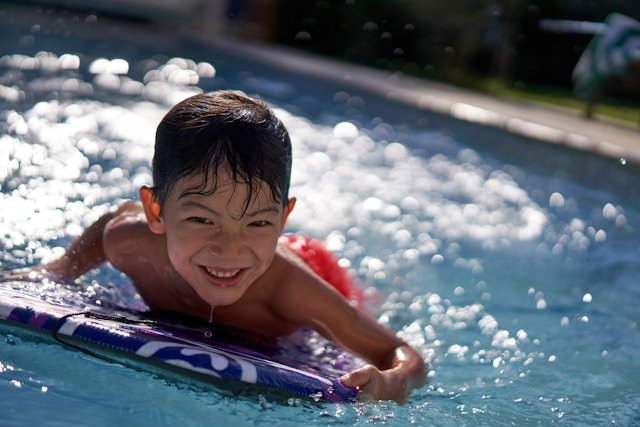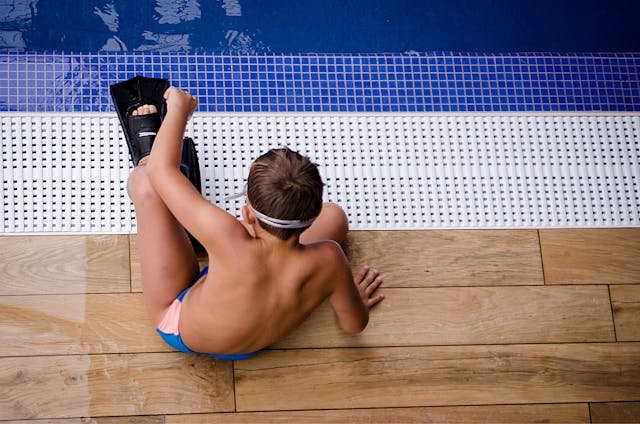Ensuring the health and safety of our children is always a priority. There are activities that not only promote physical fitness but also equip our kids with essential life skills. One of those activities is swimming. Whether it’s in a pool, a lake, or the ocean, swimming offers a myriad of benefits that extend far beyond mere recreation. Here’s why swimming should be a non-negotiable priority for the well-being and safety of our children.

Physical Fitness and Endurance
Swimming is one of the best forms of exercise for children. It engages multiple muscle groups, improves cardiovascular health, and enhances endurance. Swimming lessons provide structured guidance and instruction tailored to your child’s skill level. You can learn more here about ensuring they develop proper technique and confidence in the water. Unlike some other sports, swimming is low-impact, making it suitable for kids of all ages and fitness levels. By regularly engaging in swimming, your child can develop strength, flexibility, and overall physical fitness that will benefit them throughout their lives.
Water Safety Skills
Learning how to swim isn’t just about fitness, it’s also about safety. Drowning is one of the leading causes of accidental death in children, but swimming lessons can significantly reduce the risk. Teaching your child to swim equips them with essential water safety skills, such as floating, treading water, and proper breathing techniques. These skills could potentially save their life in a water-related emergency.
- Recognition of dangerous situations: Swimming instruction includes education on recognizing signs of distress in themselves and others, and teaching children when and how to seek help if they or someone else is in trouble in the water.
- Basic rescue techniques: Children are taught basic rescue techniques, such as reaching out with a pool noodle or using a rescue buoy, enabling them to assist others in need while minimizing their own risk.
- Emergency preparedness: Swimming lessons often incorporate drills and scenarios to prepare children for emergencies, teaching them how to stay calm and react quickly and effectively in potentially life-threatening situations.
Lifelong Skill and Recreation
Unlike many other sports or activities, swimming is a skill that can be enjoyed throughout a person’s life. By introducing your child to swimming at a young age, you’re giving them a valuable lifelong skill that can provide endless opportunities for recreation and fitness. Whether it’s swimming laps for exercise, snorkeling on vacation, or simply enjoying a leisurely swim with friends, the ability to swim opens doors to a wide range of aquatic activities. Plus, as children grow older, swimming can evolve from a structured sport into a fun and refreshing form of relaxation and leisure.
Improves Respiratory Health
Swimming is unique among physical activities in that it requires controlled breathing techniques. As children learn to coordinate their breathing with their strokes, they develop stronger respiratory muscles and increase their lung capacity. This can be particularly beneficial for children with asthma or other respiratory conditions, as swimming can help improve their breathing control and lung function. Additionally, the humid environment of indoor pools can provide relief for children with respiratory issues, making swimming a therapeutic exercise for respiratory health.
Boosted Confidence and Independence
Mastering swimming strokes and techniques can do wonders for your child’s self-esteem. As they become more proficient swimmers, they’ll gain confidence in their abilities and feel more comfortable in the water. This newfound confidence can extend beyond the pool, positively impacting other areas of their life. Moreover, swimming fosters independence as children learn to navigate the water on their own, instilling a sense of responsibility and self-reliance.
Social Interaction and Recreation
Swimming isn’t just a solitary activity, it’s also a fantastic way for children to socialize and have fun with friends and family. Whether it’s splashing around in the pool with siblings or joining a swim team, swimming provides ample opportunities for social interaction and recreation. Additionally, swimming offers a break from screens and sedentary activities, encouraging kids to stay active and enjoy the great outdoors.
Enhances Mental Health
Beyond its physical benefits, swimming has a positive impact on children’s mental health. The rhythmic movements and sensory experiences of being in the water have a calming effect, reducing stress and anxiety levels.
Swimming releases endorphins, the body’s natural mood elevators, which can leave children feeling happier and more relaxed after a swim session. Moreover, the sense of achievement that comes with mastering new swimming skills can boost self-esteem and resilience, helping children better cope with challenges both in and out of the water.

Swimming is a crucial component of every child’s health and safety toolkit. Not only does it promote physical fitness and endurance, but it also teaches essential water safety skills, boosts confidence and independence, and fosters social interaction and recreation. So, if you haven’t already, consider enrolling your child in swimming lessons or spending more time in the water together. Your investment in their swimming skills today could make all the difference tomorrow.
